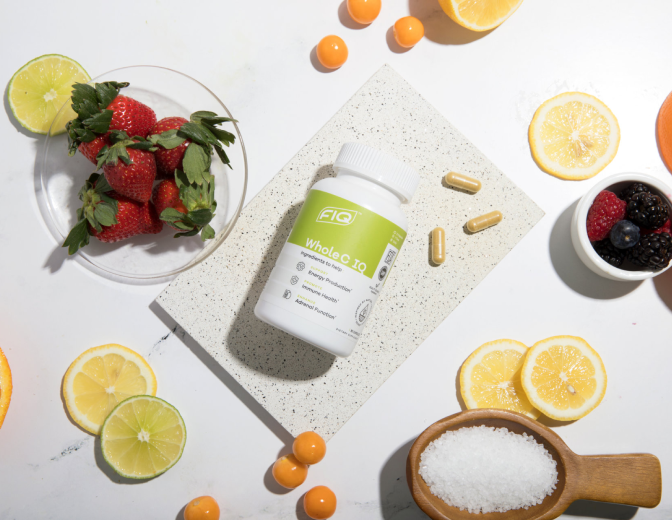So you’ve been told you have “inflammation,” “allergies,” “histamine intolerance,” or “impaired immune function.”
Each of these states is a response of the immune system. So, which natural herbs and nutrients should you use to address the root of the issue?
To best personalize your supplement regime to your unique immune imbalance, it’s important to understand what’s going on with your immune system so you can implement the right support for these areas.
The Immune System - in Short
This is one of the more complex systems of the body. It’s often spoken analogously to singular organ systems like the heart, lungs, kidneys, or liver. However, the ‘immune system’ in its entirety is actually integrated into the various systems of the body. It doesn’t have a primary “station” or location like other organ systems.We find immune activity across several areas of the body, including:
- In the blood
- On surface tissues (skin, gut, respiratory, and urinary tract)
- In the spleen, lymph nodes, liver, and brain - each with their own specialized immune cells and functions.
The innate immune system1
This is the first-line defense against pathogenic invaders, a major contributor to systemic inflammation, and has a fundamental role in programming the adaptive immune system.Within this system are white blood cells, mast cells, dendritic cells, and natural killer cells.
The adaptive immune system1
This is the “memory” of the immune system. After the innate immune system identifies a new virus, bacteria, or potentially harmful invader, it programs specialized cells of the adaptive system to “remember” the invader’s identity for future reference. In doing so, it can immediately irradicate it and prevent infections by them.This is the branch of the immune system that makes antibodies and is implicated in autoimmune diseases. The specialized cells include T-cells,B-cells, and natural killer T cells, which are hybrid cells that are also part of the innate immune response.
The adaptive immune system can also contribute to systemic inflammation via cytokines.
Cytokines2
These can be thought of as the ‘hormones’ of the immune system. They’re messenger chemicals produced by the adaptive system to communicate with the innate system.The Th-1 cytokines initiate the fight against bacterial and viral infection, while the Th-2 cytokines activate the histamine and allergy responses.
Understanding the precise area(s) that are driving your immune dysregulation allows for a more dialed-in intervention plan.
Natural Immune Support
Cultures worldwide have used herbal remedies for thousands of years. Even without a scientific understanding of the nuances of the immune system, observation and application allowed people to suss out precise herbs for specific maladies.Science has merely confirmed what ancient wisdom has known for centuries. Different natural agents are implicated in different branches and subsequent functions of the immune system.
Bolstering the immune system to enhance resiliency to pathogens or to help fight infections calls for different herbs and nutrients than quenching inflammation, easing an allergic response, or regulating cytokine production.
Immune IQ: Bolstering the Immune System - Pathogenic Invaders
Viruses, bacteria, fungi, and parasites are considered “pathogens.” Pathogens are merely organisms that can infect others and cause disease or illness.Pathogens are why we have an adaptive immune system and what it’s “programmed” to protect us from. But it’s not the pathogens themselves that cause symptoms of illness; it is the response of the innate immune system in an effort to prevent the pathogen from overthrowing the body.3
People who experience frequent illness are often told they have a “weakened immune response.” It’s not that these individuals are exposed to more pathogens; it’s that their innate immune system is not as efficient at keeping the invaders suppressed prior to symptoms arising (like fever, congestion, aches, and malaise). This is also true for people who are experiencing chronic viral/pathogenic load such as EBV.4
Herbs that boost the innate immune response include:
- Elderberry - Improves immunity to cold/flu,5 reduces duration and severity of illness,6 bolsters and enhances overall immune function,6 and supports cytokine production for effective communication between the two branches of the immune response.7
- Astragalus - increases white blood cell production,8 has antiviral9 and antibacterial10 properties, and improves chronic viral load.11
- Oregano - Several studies have demonstrated the potent antibacterial effects of oregano12, 13, 14 effectively helping the immune system clear out bacterial load and prevent systemic inflammation that can result.15 It has also shown benefits for clearing antibiotic-resistant bacteria.16
- Garlic - an ancient remedy known for its potent antimicrobial effects,17 antiviral effects,18 and regulates several inflammatory pathways.19
- MoringaLeaf - Known for its powerful antioxidant capacities, moringa leaf has also been shown to have antiviral, antibacterial, and antifungal effects, in addition to possessing anti-inflammatory properties.20
Infla IQ: Reducing the Inflammatory Response
Many individuals are told they “have inflammation.” This has become an umbrella term that conveniently covers a plethora of immune functions - but it doesn’t provide much depth of information.Inflammation can come from both the innate and adaptive immune systems. It is not always a bad thing. Our body needs healthy levels of inflammation to heal. It becomes a problem when the levels are unchecked, which prevents healing from happening.
Harmful inflammation is often the cumulative effect of the cytokine messengers released by immune cells. These messengers perpetuate the inflammatory cascade when the immune system does not respond appropriately or there is continuous exposure to the insulting agent(s).
Reducing systemic inflammation is analogous to “putting out the fire” so that the clean-up crew can get in, figure out what started the fire, and begin repairing the foundation.
There are many specific herbs and nutrients that both “put out the fire” and aid in the repair process.
- Turmeric - as the most well-known anti-inflammatory herb, many people take turmeric for its widespread ability to quench inflammation, both systemically and at its core. Turmeric has been shown to reduce cytokine production, quench free radicals that cause inflammation, and modulate immune signaling.21
- AmericanSkullcap - An ancient Native American remedy, skullcap has long been known for its calming properties. Studies have identified various compounds of this plant that improve and reduce inflammatory mediators and cytokines.22
- White willow bark - Another ancient remedy known for its anti-inflammatory properties, willow bark contains salicylic acid and has been shown to also reduce pain signaling.23
- Boswellia - Historically known for its anti-inflammatory properties, boswellia has been shown to reduce inflammatory markers and has antioxidant properties.24
- Magnesium - when your body is under stress (such as a state of inflammation), your cells require more magnesium to function optimally.25
Histamine IQ: Full-Spectrum Nutrient Support for Allergic Responses and Histamine Intolerance
Allergies are an immune system response. There are various forms and reactions to allergens, which result in different symptoms.Some allergies have been linked to overactivity of the Th-2 cytokines,26 some can cause anaphylaxis, but the most common allergic reaction that people seek to address is the histamine response.
Histamine is an important signaling molecule in the body. It is essential for wakefulness, cognition, nervous system function, digestion, and immune function. Histamine creates problems when it’s present in too high of amounts and/or not cleared out properly.27
Excess histamine often results in common allergy symptoms such as:
- Itchy, watery eyes
- Puffiness
- Hives and rashes
- Flushing
- Stuffy, runny nose
- Abdominal pain
- bloating/distention
- Migraines and headaches
- Brain fog
- Skin conditions
- Low blood pressure/POTS
Addressing mast cells and clearing out and reducing histamine release are ideal natural approaches to improving the histamine response.29 This includes the use of:
- Diamine oxidase (DAO) - This is the body's most important enzyme for breaking down histamine. It is often impaired in those with histamine intolerance. Increased levels of this enzyme via supplementation have shown dramatic improvement in histamine-related symptoms.29
- Holy Basil - Has been shown effective in improving allergic responses by blocking H1 and H2 receptors and blocking histamine signaling.30
- Ursolic acid - blocks mast cell activation and histamine receptors.31,32
- Quercetin - also prevents mast cell activation, reduces histamine receptor activity, and blocks histamine release.33
- Stinging nettle - has been shown to block H1 receptors and several other enzymes and inflammatory molecules associated with allergies. It also potently inhibits mast cell degranulation.34
- Bromelain - blocks histamine receptors, reduces histamine release from mast cells, and dampens histamine signaling by blocking mast cell degranulation.35
For additional support, many customers have found Respiratory IQ to be helpful for supporting symptoms related to allergies and sinus inflammation. Containing many of the various ingredients mentioned above but in liquid form, Respiratory IQ offers pungent herbs and oils that coat and soothe an irritated respiratory tract to offer instant relief.




